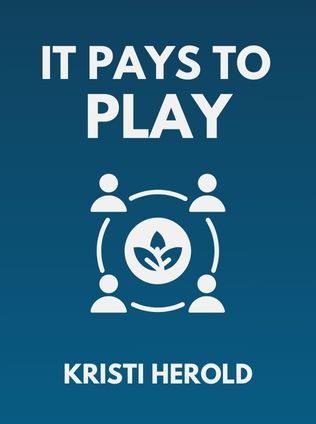
It Pays to PLAY
How Play Improves Business Culture
By Kristi Herold
Published 11/2022
About the Author
Kristi Herold, the author of It Pays to PLAY: How Play Improves Business Culture, is the founder of JAM, one of the largest adult recreational sports league providers in the world. Herold's passion for integrating play into daily life has driven her to advocate for a playful work culture that significantly enhances business environments. With a background in creating spaces where adults can engage in sports and recreation, Herold brings a unique perspective on how play can positively influence workplace dynamics. Her experiences with JAM have shown her firsthand the benefits of incorporating play into the work culture, leading to increased employee satisfaction, better retention rates, and improved overall performance.
Main Idea
The core premise of It Pays to PLAY is that intentional play within the workplace leads to a myriad of benefits, from improved physical and mental health to enhanced employee engagement, creativity, and retention. Herold argues that integrating play into the corporate culture is not just a frivolous activity but a strategic move that can result in happier employees, stronger organizational culture, and increased profitability. By fostering an environment where play is encouraged, companies can see tangible returns on investment, such as higher job satisfaction, better team cohesion, and more innovative thinking.
Table of Contents
- Introduction
- PLAY Improves Retention
- PLAY Increases Engagement
- PLAY Improves Health
- PLAY Improves Energy
- PLAY Increases Creativity
- PLAY Creates Happier Customers
- Conclusion
Introduction
The book begins with a powerful assertion: “All work and no play” makes for a dull workplace and a costly one. Herold emphasizes that organizations fostering a playful environment see improvements in retention, engagement, and innovation. The ancient Greeks, who suspended war activities for play, exemplify the profound impact of play. Herold draws parallels, suggesting that if play can halt wars, it can significantly transform workplaces.
"Play is powerful. It has stopped war in its tracks." - Kristi Herold
Herold illustrates how play is both natural and essential, providing energy boosts, engaging imagination, and developing problem-solving skills. She emphasizes that play is not limited to children; adults who maintain a playful attitude benefit significantly in terms of stress reduction, creativity, relationship-building, energy levels, and overall happiness. The book is dedicated to showing leaders that play in the workplace is crucial for a healthy corporate culture. By the end of the book, Herold aims to prove that making time for play is as important as other business facets like hiring, marketing, or production.
PLAY Improves Retention
High employee turnover is a significant challenge for many organizations, leading to wasted time, energy, and financial resources. Herold suggests that a fun, playful culture can mitigate this issue by fostering meaningful friendships and bonds among coworkers. These relationships increase job satisfaction and loyalty, making employees more likely to stay. She argues that while financial compensation is essential, the role of play in improving retention is often overlooked but incredibly impactful.
Sign up for FREE and get access to 1,400+ books summaries.
You May Also Like
The Subtle Art of Not Giving a F*ck
A Counterintuitive Approach to Living a Good Life
By Mark MansonRich Dad Poor Dad
What the Rich Teach Their Kids About Money - That the Poor and Middle Class Do Not!
By Robert T. KiyosakiHow To Win Friends and Influence People
The All-Time Classic Manual Of People Skills
By Dale CarnegieQuiet: The Power of Introverts
The Power of Introverts in a World That Can't Stop Talking
By Susan Cain



















